Following the government’s ratification of the UNESCO World Heritage Convention in 1984 the first clutch of sites in the UK were inscribed on the World Heritage List in 1986. These comprised: the Castle and Town Walls of King Edward in Gwynedd; Durham Castle and Cathedral; Ironbridge Gorge; Stonehenge and Avebury and associated sites; Studley Royal Park including the remains of Fountains Abbey; the Giant’s Causeway; and St Kilda. Celebrations are planned at many of these sites; that for Stonehenge and Avebury includes an international conference looking at how understandings of these iconic prehistoric monuments and their landscapes have changed over the last 30 years. It will be held in the Corn Exchange in Devizes, Wiltshire, on Saturday 19 November 2016, and contributions include a lecture by BU’s Professor Timothy Darvill entitled ‘Stonehenge: Beyond rock and roll’.
Category / REF Subjects
ESRC Festival of Social Sciences
Dr John Oliver, from the Advances in Media Management research cluster, recently delivered a keynote lecture at the Open Innovation Design Jam competition at the University of Glasgow. The event formed part of the ESRC’s Festival of Social Science programme of activities that ran from 5th-12th November across the UK.
The Design Jam also involved a number of short, intensive brainstorming sessions in which teams developed innovative solutions to challenges. This event was an opportunity for innovators and businesses to explore open, collective and user-led innovation.
Dr Oliver’s talk on media innovation strategies presented empirical data on how the innovation practices of UK media firms had transformed firm capabilities and corporate financial performance.
Midwifery Graduation: Honours & Awards
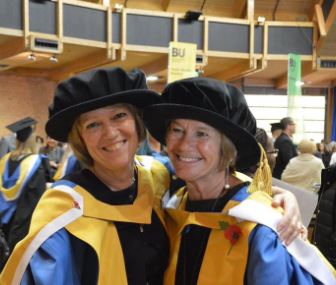 Alongside Bournemouth University’s midwifery and other health and social care students who graduated in last Friday’s ceremony, BU honoured prominent midwife Sheena Byrom OBE with an Honorary Doctorate for her services to the profession. Sheena Byrom gave an inspiring speech at Friday’s Graduation. Sheena said, “If they can keep in their hearts the passion and the drive they had when they first came to the university, it will help them to be more resilient and keep them motivated towards what they want to do. Healthcare is a blend between love and science and both are equally important. In practice, it is key that they have the skills, but the things that makes the difference are love and compassion.”
Alongside Bournemouth University’s midwifery and other health and social care students who graduated in last Friday’s ceremony, BU honoured prominent midwife Sheena Byrom OBE with an Honorary Doctorate for her services to the profession. Sheena Byrom gave an inspiring speech at Friday’s Graduation. Sheena said, “If they can keep in their hearts the passion and the drive they had when they first came to the university, it will help them to be more resilient and keep them motivated towards what they want to do. Healthcare is a blend between love and science and both are equally important. In practice, it is key that they have the skills, but the things that makes the difference are love and compassion.”
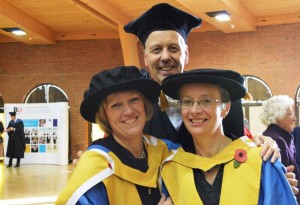 Alongside Sheena two students from the Centre of Midwifery, Maternal & Perinatal Health(CMMPH) graduated with a PhD in Midwifery. Dr. Alison Taylor received her PhD for her qualitative research on breastfeeding. Her thesis is entitled ‘It’s a relief to talk ….’: Mothers’ experiences of breastfeeding recorded on video diaries. Dr. Rachel Arnold was awarded her PhD for her research Afghan women and the culture of care in a Kabul maternity hospital.
Alongside Sheena two students from the Centre of Midwifery, Maternal & Perinatal Health(CMMPH) graduated with a PhD in Midwifery. Dr. Alison Taylor received her PhD for her qualitative research on breastfeeding. Her thesis is entitled ‘It’s a relief to talk ….’: Mothers’ experiences of breastfeeding recorded on video diaries. Dr. Rachel Arnold was awarded her PhD for her research Afghan women and the culture of care in a Kabul maternity hospital.
Congratulations to all BU undergraduates and Rachel, Alison and Sheena!
Prof. Edwin van Teijlingen
CMMPH
1st International Military Law Conference in South Africa – BU Research receives global attention
Associate Professor in International Law (BU) and War Studies (FHS) Sascha Dov Bachmann just returned from Johannesburg where he presented on Hybrid War and Lawfare at the 1st International Military Law Conference in South Africa. A great experience and and from a media point of view as well as from a BU research point of view the conference and its coverage in the regional African and international media were a full success.
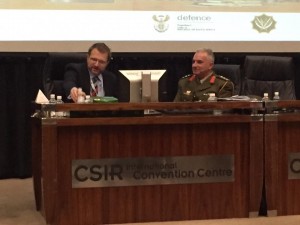
The reference below is taken from the official SA Government Media release and was taken up by various media sites inside the African Union and abroad: the UK, US, Ghana,Kenya, Sudan, NZ etc and reads as follows:
“The rest of the first day (under the sub-theme International Military Law) unpacked issues relating to the permissible and legal use of armed force by States, and the legal rules governing soldiers during such armed conflicts. Professor Sascha-Dominik Bachmann of Bournemouth University in the United Kingdom presented a paper setting out the implications of so-called “hybrid war” and the offensive and defensive use of “lawfare” (the use of litigation for political purposes aimed at impacting a State’s military operations). ”
defenceWeb – Africa’s leading defence news portal summarizes the objectives of the conference as:
The conference theme of “contemporary military law” was explored with sub-themes relating to international military law, human rights law, operational law and administration of military justice.
The objectives of the conference – to raise public awareness of the importance of military law in a democracy and to stimulate interest in academic research in this specialised field of public law to strengthen the development of South African military law – were successfully met with a number of international and local academics and military professionals presenting research papers, according to the South African National Defence Force (SANDF).
The conference was officially opened by SA National Defence Force Chief, General Solly Shoke. In his opening address he welcomed the opportunity provided by the conference for South African military lawyers to benchmark local approaches with that of other armed forces. He also expressed the wish for the conference to provide a basis for evaluating whether any amendments to military and other legislation may be necessary to empower commanders to instil and maintain military discipline.
14:Live with Dr Ashley Woodfall
Do you want to get creative for an hour? Do you have an interest in creative research methods?
14:Live is back on Thursday 17 November with Dr Ashley Woodfall.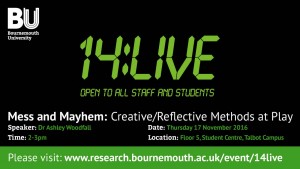
Join us as we get creative and discuss Mess and Mayhem: Creative/Reflective Methods at Play. This mess and discussion led session will be a space to discuss the use (and abuse) of creative research methods. How can they help trigger meaningful research interactions, and how the outcomes might be understood?
This session will be exploring research in a creative environment from drawing, to molding, to improv’ and beyond. We ask if creative reflective methods can share something of your own life world and whether these methods can help unlock metaphorical insights that are missed through more traditional approaches.
Come along on at 14:00-15:00 on Floor 5 of the Student Centre for an hour of mess and mayhem. There will be free drinks and snacks!
If you have any questions then please contact Hannah Jones
BES Science Slam 2016
Do you have a passion for ecology? The British Ecological Society (BES) is looking for competitors for 2016’s BES Science Slam.
What is a Science Slam?
A Science Slam is a brilliant way to showcase your research to the public, by combining it with entertainment. Scientists take to the stage to present their research in an engaging, entertaining and uncompleted manner. You can great as creative as you like, your act could involve live experiments, audience participation, song, dance, acting or something different altogether. The winners are selected through the loudest audience applause!
BES are looking for scientists from the field of ecological science and theory. You can be a PhD student or even a professor, BES want scientists who can enthuse people. Each scientist will be given 8 minutes to present their research and 2 minutes for questions.
Want to take part? Applications can be found online here. Entries must be in by 9:00 Monday 14 November 2016.
Want some inspiration? Take a look at last year’s Science Slam here.
Islam and Social Work: Culturally sensitive practice in a diverse world
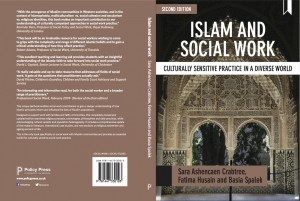 The complexities of multiculturalism as a social ontology and as a political discourse have taken a rapid and alarming turn to the right in a political moment of increasing social turbulence on issues that revolve around national identity, ethnicity and religion. It is therefore timely, if regrettably so, that the second edition of Islam and Social Work makes its debut this month.
The complexities of multiculturalism as a social ontology and as a political discourse have taken a rapid and alarming turn to the right in a political moment of increasing social turbulence on issues that revolve around national identity, ethnicity and religion. It is therefore timely, if regrettably so, that the second edition of Islam and Social Work makes its debut this month.
The first volume went to press in 2008, in my first year at BU, and my co-authors and I were overwhelmed when the book was showered with positive reviews. Regarded as not only the best, but the sole European text on this conspicuously important topic, it was also viewed as having no counterpart in the Global North (where the subject of social work and minority ethnic groups has been a dominant theme in the social work literature for decades). Since then it has been regularly cited and I been privileged to have anonymously reviewed dozens of papers on Islamic interpretations of social work practice. I have learned that Western social work is no longer the epicentre of practice – there are other worlds out there. I feel that this earlier book was, if nothing else, pivotal to opening the door much wider to be able to hear from our Muslim social work colleagues around the world, whose practice can challenge the restrictive, bureaucratised and therefore often inhuman professional processes in the UK
Strangely, however, over the years, despite the world having changed so very much since in terms of the shifting geo-political axes of power, the rise and fall of despotic regimes, the call for accountability of Western leaders implicated in invasion of Gulf nations, the Arab Spring, global terrorism, Al-Qaeda and later the monstrous birth of imploding Daesh – no one has produced a text to supersede the old first edition. And so, reader, we, Fatima Husain, Basia Spalek and I decided to produce the 2nd edition, which has been fully revised and updated, rewritten virtually from scratch, and I believe we have produced a book that is specific in detail, expansive in scope and completely international in outlook.
We hope that this will be a text that is the first port of call for all social work students across the globe who are interested in learning more about competent and sensitive practice with Muslim service user and client groups across the lifespan, as well as discovering the many beauties and wise profundities that are embedded, but often overlooked, in the youngest of the Abrahamic religions, Islam.
Professor Sara Ashencaen Crabtree
Professor of Social & Cultural Diversity
Beatriz Arrizabalaga – Returning to BU this summer
This summer I visited the Faculty of Media and Communication (Bournemouth University) as a Visiting Scholar for the second time for a period of three weeks (July-August 2016) to continue the research on Language, Communication and the Mass Media that I had started in 2015. During my second research stay at BU, I conducted research on the topics listed below:
- English as the global language: namely, its distinguishing features and its influence in other languages (mainly Spanish);
- The phenomena of culture and identity (heterogeneity vs. homogeneity);
- Transnational relationships;
- The specific language of different media spaces (mainly, advertising).
What I have learnt in these two research stays at BU forms the basis for the research project entitled Lenguaje y medios de comunicación: relaciones interlingüísticas e interculturales ingles-español (Reference: FFI2016-74858-P) (Language and the Mass Media: English-Spanish interlinguistic and intercultural relationships), for which I have applied for funding from the Spanish Ministry for Education and Innovation. Dr. Bronwen Thomas, Associate Professor at BU, will take an important part in the project, if approved and granted, thus helping to establish some institutional links between the University of Bournemouth and the University of Huelva.
Apart from the aforementioned research project, I am working at the moment on a scientific paper which analyses Spanish advertising, a particular means of communication almost completely unknown to me before my two stays in Bournemouth. My paper will have a special emphasis on the influence English advertising has – graphically, socially and linguistically.
Since the Sir Michael Cobham Library is an amazing source of a vast and rich number of bibliographical references related to the topics I am interested in, I hope to return to BU next summer to continue my research. Furthermore, I would take advantage of this third stay to get in touch with some other members of the Faculty of Media and Communication who might be interested in participating in my research project. Anyone who is interested can contact me at arrizaba@dfing.uhu.e
Brick-henge at the Jewell Academy, Bournemouth
Pupils at the Jewell Academy in Bournemouth have built a scale-model of Stonehenge in the school grounds using 80 house-bricks. The work was as part of an outreach visit by Professor Tim Darvill from the Department of Archaeology, Anthropology and Forensic Science to introduce young scholars to the results of recent research at Stonehenge. Orientated on the mid-winter sunset the model should survive long enough to help celebrate the end of term and the start of the winter festival in six weeks time!
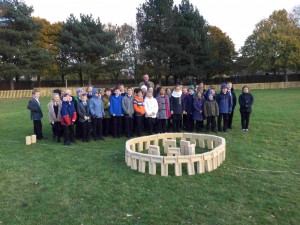
BU excavations at Cotswold long barrow reported in Current Archaeology
Current Archaeology, the UK’s best-selling archaeological magazine, features news of BU’s discovery of a previously unrecorded Neolithic long barrow in the Cotswolds in its December issue that goes on sale today. The excavations, directed by Professor Tim Darvill and Dr Martin Smith from the Department of Archaeology, Anthropology and Forensic Science, revealed a large stone-built mound dating to around 3800 BC. Such mounds served as territorial markers as well as burial places for communities living in the area. The work forms part of a larger study looking at the history and development of the Cotswold landscape since prehistoric times and includes collaboration with staff from the German Archaeological Institute in Berlin.
Royal Academy of Engineering – SME Leaders Programme
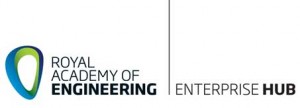
Are you working with engineering companies that would be interested in this funding opportunity?
Why not send them this information in order that they can consider making an application ?
The Royal Academy of Engineering, sponsored through the Enterprise Hub, invites applications for its small- and medium-sized enterprises leaders programme. This supports promising leaders of high growth engineering SMEs. Recipients receive a grant of between £10,000 to £15,000 towards the cost of training courses and executive education for themselves.
This scheme is open for applications by SMEs until 4pm on 24 November 2016. For further details on the scheme click on this link.
Helping Nepal to establish its midwifery profession
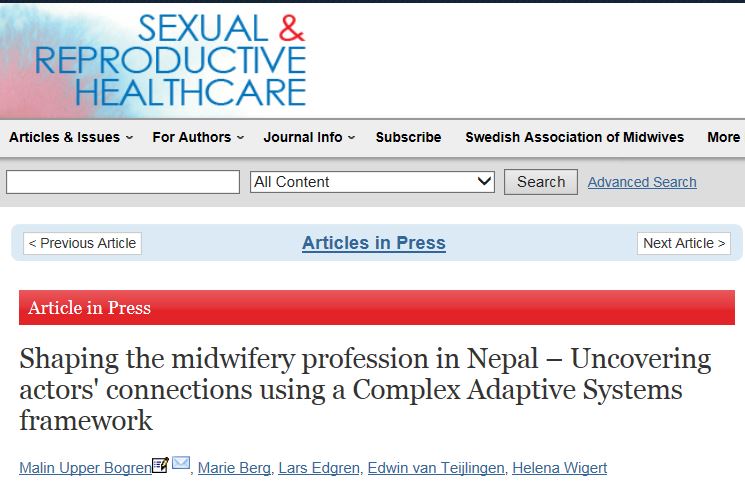 The international journal Sexual & Reproductive Healthcare (Elsevier publication) published the online first version of our latest maternity-care research paper on Nepal [1]. This paper is part of the successfully completed PhD research project of Malin Bogren (first author). The paper uses a qualitative approach based on the framework of Complex Adaptive Systems. Malin conducted semi-structured interviews with 17 key people representing eight different organisations (actors) promoting the development of the midwifery profession in Nepal. The move of midwifery from an occupation to a profession in Nepal is a challenging process. The study indicates the importance of understanding the motivations of, and barriers perceived by, actors that can promote or obstruct the establishment of the midwifery profession. It also points to the importance of informing the wider public about the role and responsibility of an autonomous midwifery profession.
The international journal Sexual & Reproductive Healthcare (Elsevier publication) published the online first version of our latest maternity-care research paper on Nepal [1]. This paper is part of the successfully completed PhD research project of Malin Bogren (first author). The paper uses a qualitative approach based on the framework of Complex Adaptive Systems. Malin conducted semi-structured interviews with 17 key people representing eight different organisations (actors) promoting the development of the midwifery profession in Nepal. The move of midwifery from an occupation to a profession in Nepal is a challenging process. The study indicates the importance of understanding the motivations of, and barriers perceived by, actors that can promote or obstruct the establishment of the midwifery profession. It also points to the importance of informing the wider public about the role and responsibility of an autonomous midwifery profession.
The paper adds to our previous work around midwifery in Nepal [2-3].
Prof. Edwin van Teijlingen
CMMPH
References:
- Bogren, M.U., Berg, M., Edgren, L., van Teijlingen, E., Wigert, H. (forthcoming) Shaping the midwifery profession in Nepal – Uncovering actors’ connections using a Complex Adaptive Systems framework. published online: October 4, 2016
- Bogren M, van Teijlingen E., Berg M. (2013) Where midwives are not yet recognized: A feasibility study of professional midwives in Nepal, Midwifery 29(10): 1103-1109.
- Bogren, M.U., Bajracharya, K., Berg, M., Erlandsson, K., Ireland, J., Simkhada, P., van Teijlingen, E. (2013) Nepal needs midwifery, Journal of Manmohan Memorial Institute of Health Sciences (JMMIHS) 1(2): 41-44.
Using flow cytometry to monitor harmful algae in coastal waters: establishing a regional testing arena in Poole Harbour with national benefits
This innovative HEIF-funded project aims to test the use of flow cytometry for its ability to replace outdated and labour-intensive ways of working (microscope assessments) for the detection of harmful algae in coastal waters. This is a research need currently under consideration by U.K. Centre for Environment, Fisheries and Aquaculture Science (CEFAS) government scientists but is not a service offered commercially by any environmental consultants. The societal need is food safety: harmful algae can accumulate in shellfish and cause human poisoning, resulting in conditions known as amnesic, paralytic and diarrhetic shellfish poisoning (ASP, PSP and DSP). Harmful algae are therefore monitored by both shellfish producers and public health scientists. Shellfish production is a significant part of the regional economy of Dorset (Poole Harbour is a major national site of oyster and mussel production for example) and harmful algae have been detected locally, sometimes resulting in shellfishery closures which can have major economic impact. The project is funded until summer 2017 and the core team is composed of Ian Chapman and Dan Franklin in the Department of Life & Environmental Sciences, with support from other LES colleagues via a project board.
Welcoming Dr Caitlin Potter to the BU Eco-Coding team

We would like to welcome Dr Caitlin Potter who joined our Eco-Coding team from Bangor University on the 31st October. Her previous work has been on microbial communities of peatlands using metagenomic techniques and she will bring expertise and experience to the Eco-coding project.
Now that Caitlin is with us we look forward to the next stage of the project; discovering what our urban pollinators have been feeding on.
Click here for more information on this project and check out our new project page on the BU Research Website.
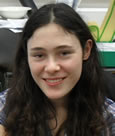
BU research presented at the 10th International Conference on Toxic Cyanobacteria (ICTC), Wuhan, China
BU academic Dan Franklin and PhD student David Hartnell presented research in Wuhan, China during the 10th ICTC last week. Attracting about 350 delegates, and sponsored by the Chinese Academy of Sciences, the conference was concerned with the growing problem of toxic cyanobacteria in freshwater resources and the ways in which ecological and health consequences can be reduced. Toxic cyanobacteria are a particular problem in China, where they have contaminated public drinking water supplies creating a serious public health issue. Dan and Dave gave 4 presentations at the conference on work carried out with BU colleagues Ian Chapman, Su Chern Foo, Eddie McCarthy and Prof. Genoveva Esteban. Dr. Andy Turner from the government biotoxin labs at CEFAS, Weymouth, an important collaborator on the BU work, also presented at the conference. The conference was a great success and enabled meetings with important researchers in the field from around the world. Dan and Dave would like to thank BU for funding some of the expenses of the trip.
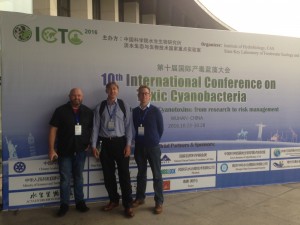
Dave Hartnell, Dan Franklin and Andy Turner at conference venue
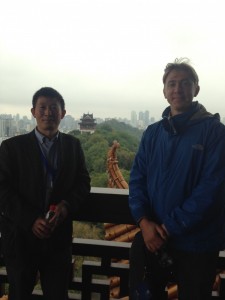
Dan Franklin with colleague Dr Zhou Yang at Yellow Crane Tower
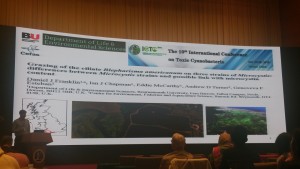
Giving presentation at ICTC 10
Stern review of the REF – what next?
 The Stern review of the REF was published in July 2016. The government have accepted the main recommendations, and we are expecting in November a HEFCE technical consultation on implementation – to affect the next REF exercise (probably in 2021). It is expected that the new arrangements will be settled by the summer of 2017.
The Stern review of the REF was published in July 2016. The government have accepted the main recommendations, and we are expecting in November a HEFCE technical consultation on implementation – to affect the next REF exercise (probably in 2021). It is expected that the new arrangements will be settled by the summer of 2017.
So what did Stern recommend – and what is likely to be in the consultation?
- The main thing that Stern might have done, but did not do – following widespread concern in the sector – was move to a metrics-based approach for the REF. Peer review and case studies will remain and there will be an opportunity to celebrate success wherever it is found in the REF – not a metrics based ranking. There may be new metrics, and a new Forum for Responsible Research Metrics has been launched, but the key is that these metrics should be used responsibly and carefully.
- All research active staff should be returned in the REF (and allocated to a unit of assessment).
- Outputs should be submitted at Unit of Assessment level with a set average number per FTE, but with flexibility for some faculty members to submit more and others less than the average. A total cap should be set based upon two outputs on average per FTE with an individual cap (e.g. six) and a minimum per FTE (potentially 0).
There has been some concern expressed about these changes – Maddalaine Ansell (University Alliance) via Wonkhe and James Wilsdon in The Guardian, 29th July 2016. At BU, our strategy is that all academic staff should be active in research as part of Fusion, so we will not be moving towards teaching only contracts. We hope the sector will not do so either – we will consider pressing for all staff to be included and remove any risks around the definition of “research active” to avoid this
- The total number of outputs per UoA should be adjusted so that it does not significantly exceed the 190,000 reviewed in REF2014. This may require the average number of outputs submitted per faculty member to be below two.
- Outputs should not be portable. The review proposes that outputs should be submitted by the HEI where the output was demonstrably generated and that work should be allocated to the HEI where they were based when work accepted for publication. There may be some flexibility around maximum numbers when staff have moved- e.g. maximum three outputs from those who have left.
Concern has been expressed that this will restrict employment options for early career researchers, e.g. Paul Kirby. James Wilsdon again “the broader move to reduce output numbers and decouple them from individuals should reduce pressure on those at the start of their career, or who take time out of research because of childcare, illness or caring responsibilities” Other views: – it might be fairer to early career researchers who will be recruited on potential not previous publications
- Institutions should be given more flexibility to showcase their interdisciplinary and collaborative impacts by submitting institutional level impact case studies
- Impact should be based on research of demonstrable quality. However, case studies could be linked to a research activity and a body of work as well as to a broad range of research outputs
- Guidance on the REF should make it clear that impact case studies should not be narrowly interpreted, need not solely focus on socioeconomic impacts but should also include impact on government policy, public engagement and understanding, cultural life, academic impacts outside the field and impacts on teaching – the report recommends that research leading to impact on curricula and/ or pedagogy should be included. BU welcomes these changes and we look forward to seeing more details of these plans.
So watch this space – once the consultation is launched the Research and Knowledge Exchange team will be working with the policy team to prepare a BU response. You can read more about BU’s policy and public affairs work on our intranet pages.
Researching Talbot Campus Biodiversity
Ever wondered what wildlife we have on campus? Volunteer students and staff from the Dept. of Life & Environmental Science Green team are initiating a series of Student Environment Research Team (SERT) projects to find out and you can join in. We will help monitor the successful use wildlife is making of the habitats, nesting boxes and wild food resources that are being created on campus. The wildlife- friendly work is being spearheaded by the Estates Team, led by Dr Neil Smith and supported by the Biodiversity Action Plan Group.
There is a chance to get involved in a bit of campus habitat creation yourself this week if you like – join us this Friday at noon to help plant flower bulbs around the Fusion building. The bulbs have been chosen for both their wildlife and aesthetic value. Estates have bought the bulb and the planting design has been developed by a SERT of six students for Ecology & Wildlife Conservation BSc mentored by Damian Evans and Anita Diaz. See which bulbs here – bulbs-for-fusion-building-planting
Join us if you can and if you’d like to get involved with campus biodiversity creation and monitoring in some other way please contact Damian Evans devans@bournemouth.ac.uk
Festival of Learning 2017 – What could you do?
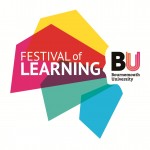 If you are still searching for some inspiration for Festival of Learning 2017, you can find our previous blog post here with some suggestions for engaging events. But most importantly, make sure you come along to one of our drop-in ‘Support for developing your idea sessions’ and talk to us! Additionally, we’re also offering a bookable training session for you to find out more about ‘Developing a public engagement event’. Please book your place via OD.
If you are still searching for some inspiration for Festival of Learning 2017, you can find our previous blog post here with some suggestions for engaging events. But most importantly, make sure you come along to one of our drop-in ‘Support for developing your idea sessions’ and talk to us! Additionally, we’re also offering a bookable training session for you to find out more about ‘Developing a public engagement event’. Please book your place via OD.
You may have already planned your event and now looking for ways of making it more appealing to members of the public. Regardless of the stage of event planning that you are at, we have a few extra ideas to give your event a boost!
The forefront of gene therapy
This event was a presentation from two experts Michael Linden and Nick Clarke, exploring how viruses can be used as tools to replace or repair faulty genes. To boost the interest of the audience and get them more engaged, the academics used an interactive voting system. Through the presentation they had some fun questions for the audience, related to genetics in general but not necessarily to the actual research. Examples of questions that captured audience’s attention were:
What percentage of genes do we share with a cabbage?
What percentage of genes do we share with bananas?
You may be surprised to know that humans share 50% of genes with bananas and 45% with cabbage.
Antarctic ice shelves
During this presentation Bernd Kulessa and Suzanne Bevan shared their tales from ten years of working in Antarctica. To give the audience a better idea of what life in the frozen wilderness looks like, the academics used not only photographs, but also 3D google maps. The maps show all of the stops they made on the journey to Antarctica, which not only added different dimension to the talk but also made it more personal.
The secret life of animals
How do you track whales diving deep underwater or birds flying high above us? Rory Wilson has developed pioneering electronic tags that allow researchers to monitor movement, behaviour, energy exposure, temperature and feeding patterns of hard-to-observe animals. Sounds interesting, but how do you translate these readings in simplified language to ensure your audience stays engaged? You simply organise for someone in penguin costume to copy the movement readings of actual penguin, while planking on a chair!
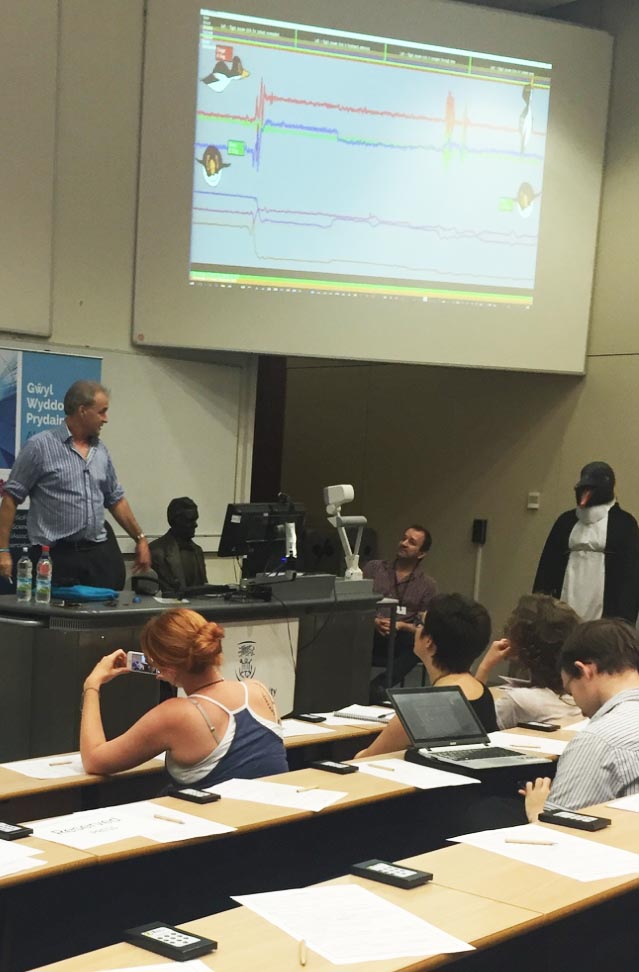
These events took place as part of the British Science Festival in Swansea, 2016.











 Read and sign up to BU’s Policy Influence Digest
Read and sign up to BU’s Policy Influence Digest Upcoming opportunities for PGRs – collaborate externally
Upcoming opportunities for PGRs – collaborate externally BU involved in new MRF dissemination grant
BU involved in new MRF dissemination grant New COVID-19 publication
New COVID-19 publication MSCA Postdoctoral Fellowships 2024
MSCA Postdoctoral Fellowships 2024 Horizon Europe News – December 2023
Horizon Europe News – December 2023